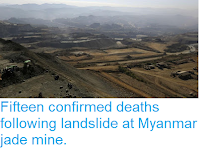A total of 61 people have now been confirmed dead following a landslide in Mon State, Myanmar, on Friday 9 August 2019. The incident happened when part of a mountainside collapsed onto the village of The Phyu Gon, following several hours of rain associated with the Southeast Asian Southwest Monsoon, which has also
caused a series of landslips and flash floods across southern Myanmar and neighbouring Vietnam. Landslides
are a common problem after severe weather events, as excess
pore water pressure can overcome cohesion in soil and sediments,
allowing them to flow like liquids. Approximately 90% of all landslides
are caused by heavy rainfall. As well as those killed, around 35 people have been treated for a variety of injuries and about 150 have been displaced from homes in the village. It is highly likely that more bodies will be found as work to clear the site continues.
Rescue workers at the scene of a devastating landslide in Mon State, Myanmar, on 12 August 2019. Associated Press.
Monsoons are tropical sea breezes triggered by heating of the land during the warmer part of the year (summer). Both the land and sea are warmed by the Sun, but the land has a lower ability to absorb heat, radiating it back so that the air above landmasses becomes significantly warmer than that over the sea, causing the air above the land to rise and drawing in water from over the sea; since this has also been warmed it carries a high evaporated water content, and brings with it heavy rainfall. In the tropical dry season the situation is reversed, as the air over the land cools more rapidly with the seasons, leading to warmer air over the sea, and thus breezes moving from the shore to the sea (where air is rising more rapidly) and a drying of the climate.
Diagrammatic representation of wind and rainfall patterns in a tropical monsoon climate. Geosciences/University of Arizona.
Much of Southeast Asia has two distinct Monsoon Seasons, with a Northeast Monsoon driven
by winds from the South China Sea that lasts from November to February
and a Southwest Monsoon driven by winds from the southern Indian Ocean from March to October. Such a double Monsoon Season is common
close
to the equator, where the Sun is highest overhead around the equinoxes
and lowest on the horizons around the solstices, making the solstices
the coolest part of the year and the equinoxes the hottest. However
Myanmar is largely protected from the Northeast Monsoon by the mountains
separating the country from Yunnan Province in China.
See also...
Follow Sciency Thoughts on Facebook.









